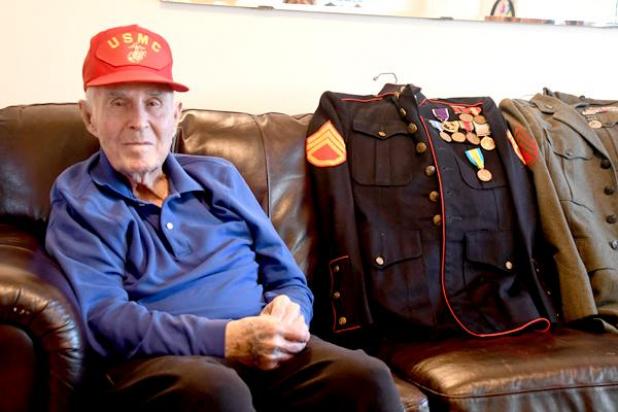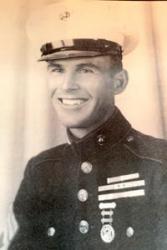
Hardie Richards is pictured next to his Marine uniforms. He served in the Korean War, where he was wounded in combat and received the Purple Heart. At nearly 96 years old, he still has shrapnel in his shoulder and is honored to have served his country. — Andrew Nygaard | The Holyoke Enterprise
Bravery under fire

Hardie Richards moved to Holyoke in October 2018 from Idaho Falls, Idaho, to be closer to his family. The nearly 700-mile trip may seem like a lot, but that’s nothing compared to the trip he made from Texas to fight in the Korean War, where he was wounded in action and received the Purple Heart.
Richards, who now lives with his daughter-in-law, Debbie Richards of Holyoke, will be 96 in November, and he still has shrapnel in his shoulder from the artillery wound he received in combat. He was in the Marine Corps twice. He enlisted at age 18 and was later called up from the reserves when he was 22.
“Everywhere they could get a man, they got him,” he said, noting that the situation on the Korean Peninsula was desperate at the time.
Richards remembers that the first time he was in the Marine Corps, he was aboard a ship that carried men meant to be reinforcements for the invasion of Japan at the end of World War II.
“Then they dropped the A-bomb,” Richards said. “I don’t think very many knew anything about the atom bomb. After they dropped it, they knew it was a very dangerous weapon.” The ship then returned the Marines to Guam.
“My longtime friend was on the same boat,” Richards said. “We stayed together. We were in college together and we were together in the Marine Corps.”
Richards said that after the dust settled from the atom bomb, it wasn’t long until he was called up and retrained in a short refresher course to prepare for the Korean War.
“They flew us over, with all our gear and weapons included, on a commercial airline,” he said, adding that they landed in Japan, which was still in the process of being rebuilt.
He celebrated Christmas in Japan in 1950, and he said the Marine Corps was not yet up to the level it was supposed to be in terms of troop numbers.
Richards said that at that time, General Douglas MacArthur decided on a plan that would change the war.
The Marines invaded the coast of Korea, which Richards said had an extreme high tide that could reach 60-70 feet.
“One of the reasons he used Marines was because they had been equipped and trained for that type of warfare,” Richards said of the amphibious landing.
The Marines cut the enemies’ supply lines, more or less disrupting them. Richards said that at this time, China began to get nervous that U.S. forces would invade, so they sent troops in. Some Marine regiments were by themselves rather than all together.
“They had to fight their way back out,” Richards said, “which they did.”
His role in the war was as section leader of a machine gun crew, and he oversaw between 25 and 30 other men as a staff sergeant.
At one point in the conflict, Richards had to go to the sickbay. Though he was reluctant to go, he was forced to do so.
Once the regiment was refitted, Richards said they were on the attack again, fighting guerillas in the mountains.
Richards was wounded at this point. “We were on the attack,” he said. “We had a pretty stiff battle going on. The mountain where we attacked, they were set up on the other side. We had to knock them out before we could go any further.”
He said they were losing enough men that they had to be reinforced, and each outfit was replaced.
There was heavy combat in the firefight. “One of my gunners was in this hole the Chinese had occupied before,” he said. “We had driven them out of there. He jumped in, and I jumped in after him. We were covered from frontal attacks, but not from artillery overhead.”
Richards was hit in the shoulder, and shrapnel went through his body and came out of his back. He said the enemy had begun to fall back, and his gunner wanted him to move.
Richards said, “I remember what I told him, which was, ‘I can’t move,’ which I couldn’t.”
A corpsman from a different platoon was helping the wounded, and he dragged Richards across the crest of the mountain and out of the fight. The Navy had set up an aid station there, and the corpsman stopped the bleeding with a hemostat, preventing Richards from bleeding to death.
Richards said that by that time, the enemy was being overwhelmed. He was carried down to the bottom of the mountain, and he was taken to a company aid station, where he said for one of the first times, wounded men were being rescued by helicopter.
He estimated that about half of his men were also injured in the fighting. He was flown out the next morning, first to a field hospital and then to a hospital ship that took him to a Japanese naval base that had been refitted.
He was then flown to Hawaii, where there was an all-service hospital. “We were feeling pretty good when we got to the hospital in Hawaii,” Richards said. He added that evacuation planes had litters stacked up to the planes’ ceilings. From Hawaii, he was evacuated to San Francisco, California, and then to a Naval base in Corpus Christi, Texas.
After appearing before the Naval Board in Charleston, South Carolina, he went back home to Vera, Texas. He said that in all, he was in hospitals for about 10 months.
Richards worked as a farmer and rancher with his parents and eventually went back to school at Oklahoma A&M, which later became Oklahoma State University, using the GI bill to become an animal nutritionist. He noted that he had been all over the country after the war, including managing a small feedlot and a pellet mill in Louisiana.
He and his wife, Betty, had three sons. “I couldn’t have gone to school if not for her,” he said. “I’d just like to add that my wife was my best friend. I couldn’t have done what I did without her. We were married for about 65 years.”
Reflecting on his time in the Marine Corps, he said, “I thought we did a service. Russia was laying the groundwork for control everywhere, and we stopped that.” He is honored to have served his country. He said people have really been good to him and he appreciates it very much when they thank him for his service.
